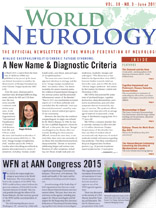By Donald Silberberg, MD

Donald H. Silberberg
Two remarkable meetings took place in March in Durban, South Africa. On March 25, the National Institutes of Health (NIH) (U.S.) convened a workshop on implementation science, that is, how to use research findings, whether epidemiologic, basic science, clinical or economic studies, to influence public policy. In a previous editorial, I referred to this as “translational research,” the concept of moving from research data to utilization.
Investigators supported by the Fogarty International Center (FIC), NIH, presented the results of studies that are beginning to achieve this, in Burkina Faso, Democratic Republic of the Congo (DRC), Nigeria, South Africa, Uganda and Zambia. Discussion centered on both impediments in achieving implementation, and on what has worked in some locales. All of the presenters and discussants agreed that further efforts are needed to develop approaches that will use research findings to improve neurologic and psychiatric health in every country, and the need to provide this information to all investigators in low- and middle- income countries. Interested investigators should watch for future notices from the FIC.
The NIH workshop was followed by the 12th International Conference of the Society of Neuroscientists of Africa (SONA). In addition to basic and clinical neuroscience presentations by invited speakers from Italy, South Africa, Spain, Sweden, the U.K. and the U.S., investigators from all regions of Africa presented 157 posters and platform talks. At least half of these dealt with clinically relevant topics, ranging from studies of trypanosomiasis in the DRC, to pain following traumatic spinal cord injury in Zimbabwe. The abstracts can be viewed at www.sona2015.com. The next meeting, in 2017, will be held in Uganda. This meeting is clearly designed to include clinical neurologists as well as neuroscientists.
